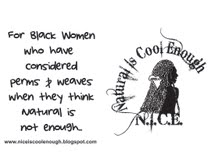Given that today is the second day of Kwanzaa, and the principle of focus is Kugichagulia, which is to define ourselves, create for ourselves and speak for ourselves, I think that a review of the new film Django is befitting here. It is actually quite a complex film to discuss so I will begin with an analysis pertinent to N.I.C.E., which is how was the hair of the main Black/African protagonists depicted and was it on point? Well, if we begin with the opening scene, there is no other way to describe Jamie Fox's (Django's) hair (see photo below) than "nappy." It was beautifully kinky, wild, unkempt and exemplary of what one may expect that a slave would be going through from a hair vantage point. It was symbolic of the situation that the slave was going through, which was devastating, while simultaneously indicating that one cannot truly be oppressed with his hair representing symbolic strength and growth in the midst of suffering and struggle. Kerri Washington's (Broomhilda von Shaft's) hair was also beautifully natural in the film and seemingly neat and tamed, exemplifying a sense of strength, character and uniformity in the midst of devastating chaos in her life through deep, overriding oppression. Her beauty remained apparent, no matter what was done to her, even in her seemingly "damsel in distress" state which surfaced as womanism as she rode off, saved by her man in the end, still with her dignity and natural tresses in tact. Natural Is Cool Enough was clearly indicated in the film.
 As for the film on an overall basis, perhaps one will walk away with mixed feelings and emotions and some questions, which may surface are as follows:
As for the film on an overall basis, perhaps one will walk away with mixed feelings and emotions and some questions, which may surface are as follows:
1. Was the level of blood and gore in the film necessary?
2. Is it okay to leave the theater feeling empowered and validated as a result of seemingly justifiable revenge and what does that say about one's perspective regarding retaliation for unspeakable cruelty experienced by the slaves?
3. Does it make more sense to have more animosity towards the Samuel Jackson character than the white perpetrators of atrocities against the slaves and was he ultimately redeemable or should he have been dealt with in the way that Django dealt with him?
4. How should feelings be processed towards the Mistress and her ultimate fate?
5. Given the gun debate in the United States at this time, what is the ultimate conclusion regarding guns during that time, particularly in terms of self-defense and retaliation/revenge by the slaves?
The bottom line is that so as not to give-away any essentials of the film, I won't provide answers to the above questions. However, I will say that the film may leave one thinking about these questions and more, upon exiting the theater and for many hours after. Usually, that is a sign that the film was thought provoking and intense and as a result possibly worthy of praise. I do have to point out that Spike Lee, although he admits that he has not seen the film, indicates that he will not see it and that it is disrespectful to ancestors. As one who feels that Spike Lee's perspective as a filmmaker is worthy of consideration, I take this to heart. Perhaps an analysis of whether this film contributes to the legacy of the ancestors of Black/African American people is warranted which is what I will embark on in terms of my own thoughts. How does this film ultimately reflect the experience of my ancestors? It is a tough question, which may only be answered by assessing how you feel in the moment that the credits roll at the end of the film and you walk out. Ask yourself do you feel redemption, betrayal, animosity, pride, shame, etc. and let your own perspective be your guide. Nevertheless, in terms of the character, Django, Kugichagulia (self-determination) was definitely exemplified.
As for the hair of the protagonists, Django and Broomhilda, in the film, natural hair was definitely showcased, which is historically accurate and definitely showed that the film embraced the fact that Natural Is Cool Enough and that is N.I.C.E.!
1. Was the level of blood and gore in the film necessary?
2. Is it okay to leave the theater feeling empowered and validated as a result of seemingly justifiable revenge and what does that say about one's perspective regarding retaliation for unspeakable cruelty experienced by the slaves?
3. Does it make more sense to have more animosity towards the Samuel Jackson character than the white perpetrators of atrocities against the slaves and was he ultimately redeemable or should he have been dealt with in the way that Django dealt with him?
4. How should feelings be processed towards the Mistress and her ultimate fate?
5. Given the gun debate in the United States at this time, what is the ultimate conclusion regarding guns during that time, particularly in terms of self-defense and retaliation/revenge by the slaves?
The bottom line is that so as not to give-away any essentials of the film, I won't provide answers to the above questions. However, I will say that the film may leave one thinking about these questions and more, upon exiting the theater and for many hours after. Usually, that is a sign that the film was thought provoking and intense and as a result possibly worthy of praise. I do have to point out that Spike Lee, although he admits that he has not seen the film, indicates that he will not see it and that it is disrespectful to ancestors. As one who feels that Spike Lee's perspective as a filmmaker is worthy of consideration, I take this to heart. Perhaps an analysis of whether this film contributes to the legacy of the ancestors of Black/African American people is warranted which is what I will embark on in terms of my own thoughts. How does this film ultimately reflect the experience of my ancestors? It is a tough question, which may only be answered by assessing how you feel in the moment that the credits roll at the end of the film and you walk out. Ask yourself do you feel redemption, betrayal, animosity, pride, shame, etc. and let your own perspective be your guide. Nevertheless, in terms of the character, Django, Kugichagulia (self-determination) was definitely exemplified.
As for the hair of the protagonists, Django and Broomhilda, in the film, natural hair was definitely showcased, which is historically accurate and definitely showed that the film embraced the fact that Natural Is Cool Enough and that is N.I.C.E.!














